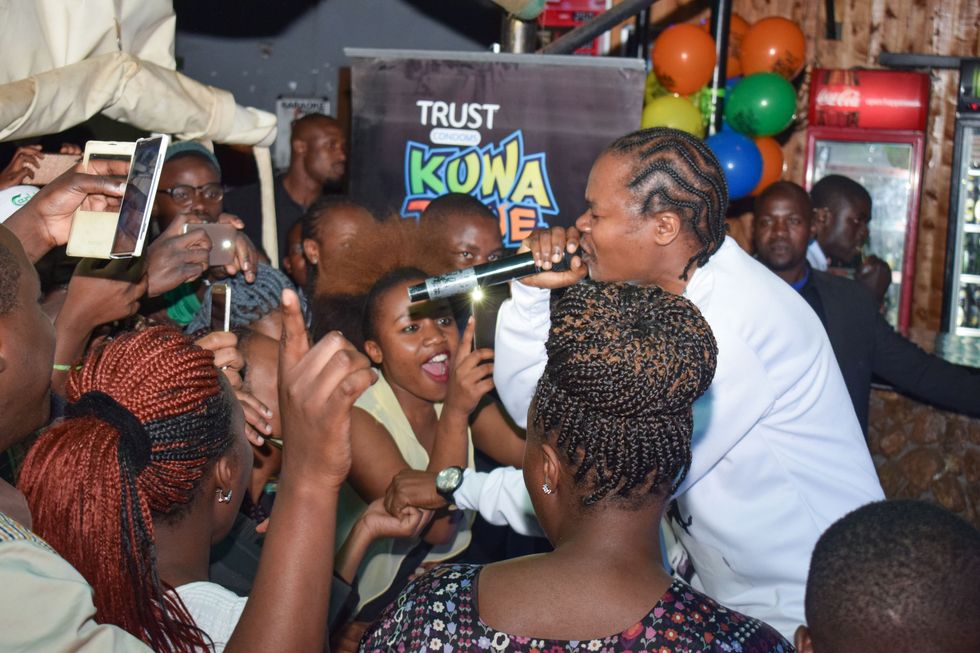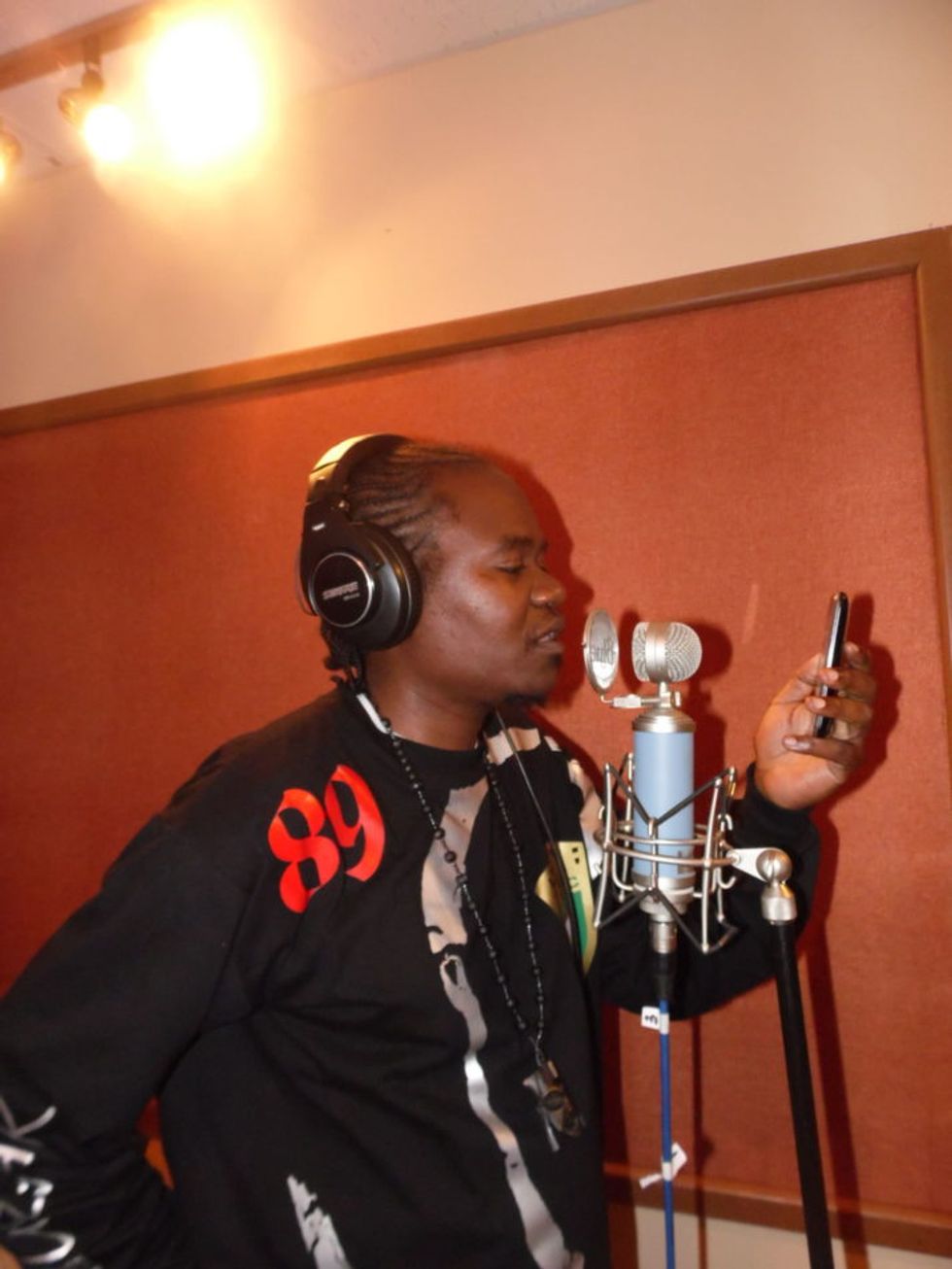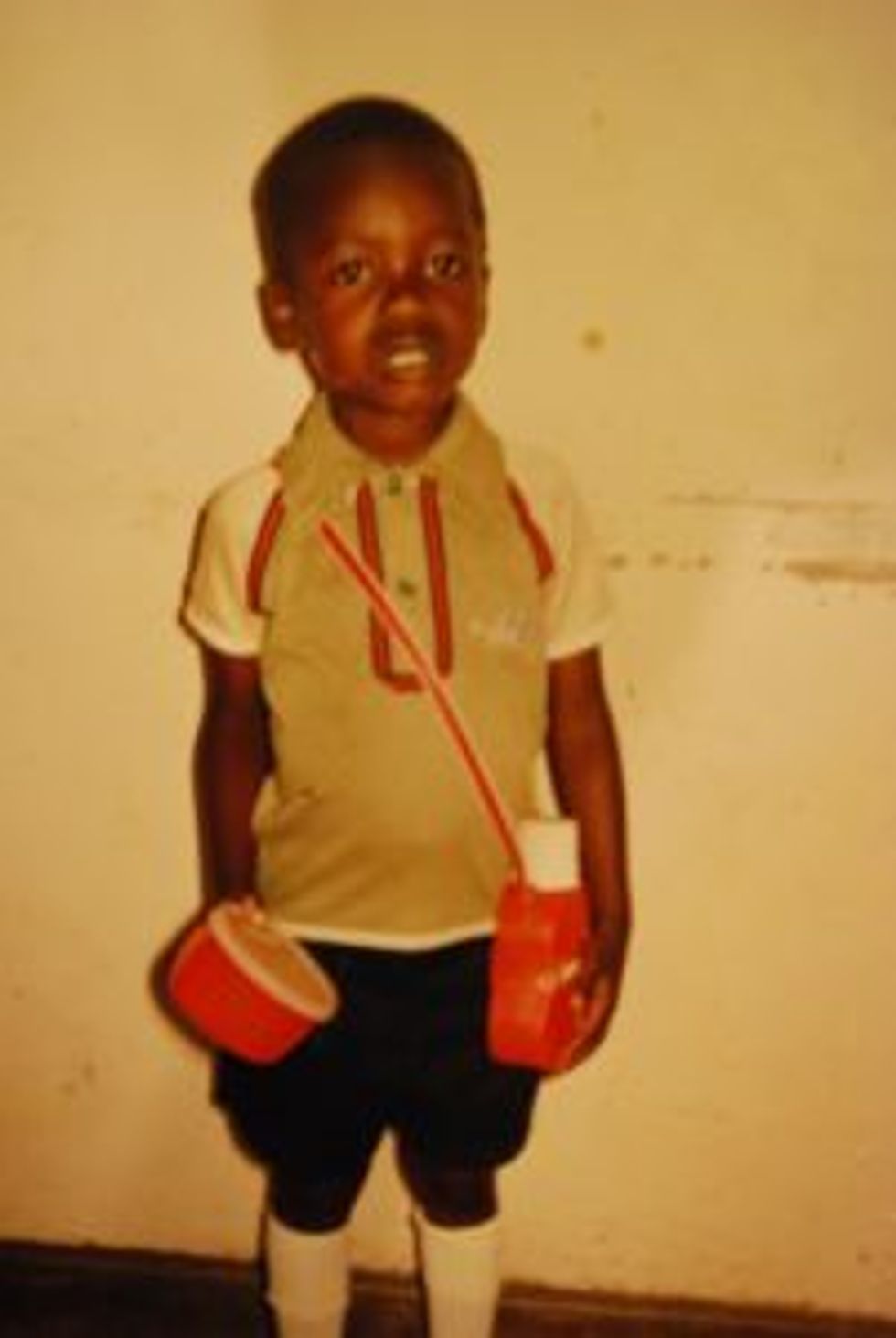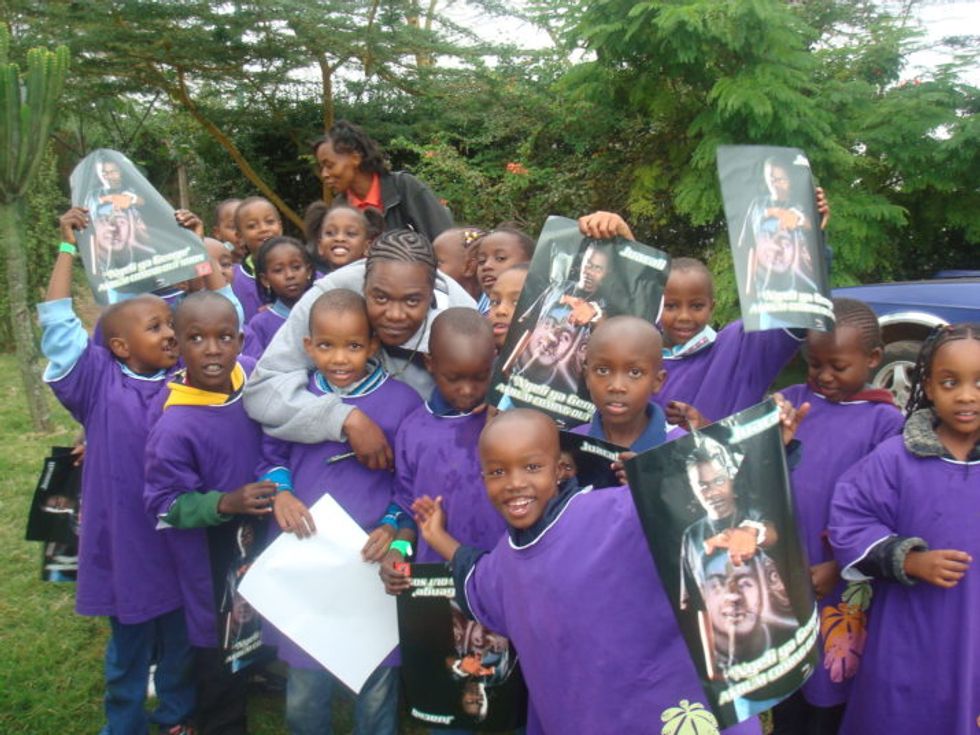Sheng’ and the City: The Shared Fortunes of Nairobi, It’s Language and the Hardest Working Man in Kenyan Rap
For the originator of genge, Kenyan gangster rap, staying relevant means adapting to the times while ruthlessly maintaining authenticity.

KENYA—Over a Keggah beat, Jua Cali, the city’s biggest rapper welcomes visitors to Nairobi in the self-confident, cheeky banter the city is known for.
Karibu Nairobae.Wageni wote wanakaribishuwa Nairobae
Nairoberry jina yake ya tatu
So ukiingia huku kaa rada
Usizuiane na karao sana
Usizuiane na jirani wako sana
It’s hard to imagine these lyrics as the opening verse to a celebration to one of Africa’s best-known cities, but they are.
“You’re all welcome to Nairobae (a fusion of the city’s name with the slang term “bae”), or Nairobbery as it’s known. If you come here, be wary. Don’t get too confrontational with the police. Don’t get too confrontational with your neighbour.”
In the accompanying video, cruising through the city on the back of a truck, Jua Cali proposes a toast to a city that defies all expectations, good or bad; that keeps us on our toes whether we like it or not; that keeps us wary but always reminds us to laugh.
Karibu Nairobae.
Nairobi. Nairobbery. Nairobae.
It’s no secret that Nairobi is one of the most aggressive capitals in Africa, if not the world, but from his office and studio in one of the more affluent neighbourhoods in the city, Jua Cali is somewhat sheltered from the vagaries of the city. It’s a far cry from "California"the tough neighbourhood where he grew up and from where he gets his name. From this secure yet simple office building, the hardest working man in Kenyan rap tells me about his origins, what drives him and the ways in which his music ties him inextricably to the fortunes of this city.
“Nairobbery,” the nickname that Jua Cali refers to in his rap, was earned in the 1990’s as Kenya’s economic fortunes dwindled and violent crime increased dramatically. Back then you couldn’t drive through the central business district with your windows down as petty thieves would reach into your car to try and grab your watch, earrings or necklaces. Austerity measures in the late 1980’s had taken a huge bite out of public funding for services and public sector wages, and the government’s violent resistance to the 1990’s democratisation movement only compounded issues. The Kenya shilling collapsed, but wages stayed stagnant, and working class neighbourhoods like California bore the brunt as residents could not even turn to farming to subsidise their incomes.
The music scene wasn’t insulated from the political situation. Popular music had suffered under the authoritarian Moi regime, that did not hesitate to arrest musicians like Ochieng’ Kabaselleh for even alluding to political accountability or social change. Under the threat of indefinite detention and possible torture, self-censorship was common. Those who persisted relied in some form on state largesse to earn a living, and many more simply quit. The airwaves—or perhaps airwave as there was only one radio station, state broadcaster KBC—were there filled with campy patriotic music or mindless preachy, pseudo-pop.
It wasn’t until the pro-democracy era in the 1990’s that Kenyan musicians began to expand both creatively and thematically, and it was in these heady days of experimentation that Kenyan rap emerged. The first few cuts were as campy as their sung predecessors. Jimmy Gathu warned matatu driver’s to keep their eyes off female passengers in “Matatu Driver.”
Ndalin’ P’s “Four In One” made a tremendous splash, notable for the rappers use of 4 languages—English, Swahili, Sheng’ and Gikuyu—in a single track even though the song was completely lacking in substance.
Swahili Nation, a group of Kenyans recently returned from the USA also made waves with their smash hit “Hakuna Matata” (no, not that one)—sampling a cheesy love song, sung-rapped over a catchy beat. None of these were working musicians. With the exception of Gathu’s subsequent successful career as a broadcaster—not one endured as rappers beyond their first tracks. It was into this scene—thirsty for content, loaded with hints of commercial viability but strewn with one hit wonders—that Jua Cali entered in the early 2000’s.
Ngeli ya Genge
Jua Cali doesn’t look the way you imagine a music revolutionary would look, but then again, in a society locked into convention and “decency”, a man in cornrows and chains is pretty revolutionary stuff. We speak the way most Nairobi residents speak to each other: switching rapidly between English, Kiswahili and Sheng’, and it is quickly apparent that he is very conscious of his place in the country and the responsibilities that entails.
Sheng’ is integral to the Jua Cali identity. The patois that fuses Swahili, English and local languages in various permutations reveals much about the speakers’ age, economic class and the language they speak at home. Jua Cali has thoughts on why this language matters so much. To him, Kenyans are at our most authentic when we speak to each other in sheng’ because we are in essence, the product of all these influences. “Sheng’ wasn’t premeditated,” he says, “there was no plan. It just came naturally. People mix the languages because human beings used language to communicate and we need to communicate in the easiest way possible”
Few would contradict him when he says there is nothing more Nairobi than sheng’ - an unbelievably malleable language in which a 5 minute exchange of bon mots includes, excludes and summarises individuals for the speaker. Take for instance the sheng’ word for matatus—the minivans that are the backbone of Kenya’s transport system. Upper class Nairobi residents may call them “javs”, short form for “javelin” because it looks like you’re about to throw a javelin when holding onto the rail. Middle class residents are more likely to say “mat”, while working class residents are more likely to say “mathree”, a swahilicisation of the word matatu where “tatu” is the Swahili word for three. And on it goes.

Jua Cali draws his name from the California Estate which, like all the other working class neighbourhoods in Nairobi’s sprawling Eastlands suburb, has deteriorated dramatically. In it’s early days, California was home to working class black Africans in a deeply racially segregated Nairobi. Today insecurity is rife, violence is common, and public services are a laughable rumour. And it is to California’s grit that Nairobi owes its most enduring style of rap of which Jua Cali is both a pioneer and ambassador. Genge, a Swahili word meaning “gang”, is Kenya’s answer to the USA’s gangsta rap. Brash, cocky but still far more genteel than it’s American counterpart, genge was initially hard on Kenyans’ ears—in particular, the fragile upper class ears that were more likely to spend money on music.
Genge, characterised by sheng’ rhymes over a melodic, heavily synthesized beat, was born in a home studio between Jua Cali and his long time producer-collaborator, Clemo. The sound itself is simple and in it’s early days could be reproduced by anyone with a keyboard and a method of recording. What makes genge unique was that the lyrics were being delivered in sheng’ in an English obsessed Nairobi—even while the government continued to try and ban it, blaming it for killing English and Swahili at schools.

Coming up in California, Jua Cali himself speaks a gritty version of sheng’ that he hardens on his records with an emphatic flow punctuated with a characteristic lilt at the end of each phrase. It’s a brash and arrogant style that is very California but is almost nothing like the man himself, who in person is quieter and more introspective. Jua Cali observes, “sheng’ is what makes genge a Nairobi sound, “besides nyama choma (roast meat), people know Nairobi for sheng’”.
According to Jua Cali, genge was born out of frustration that what was being played on radio didn’t feel authentic. In 2004, Jua Cali and Clemo were four years deep into trying to tap into the California sound all around them. “We were frustrated,” Jua Cali says, “when they played tracks on radio, they didn’t make a distinction between different forms of local music. We felt that we had a voice and we could contribute something unique. So we came up with the name of the sound”.
The name they chose was a double-edged sword. They finally had an identity that they could frame their music around, but mainstream radio, ran by older folks still struggling to emerge from the authoritarian era and still wary to cause offence, balked at the aggressive name. “We didn’t realise there would be so much resistance. We didn’t expect so many people to try and put us down”.
Anyone who knows teenagers knows that the easiest way to get them to like something is to ban it. And so it was with genge. The more the government resisted, the more popular the genre became. “When they rejected us, they set us apart,” recalls Jua Cali. Genge became a mark of “authenticity”, setting apart “real” Nairobians from posers. And by the end of the decade, genge was established as the Nairobi sound.

Surviving Change
Genge is Nairobi as music. A gritty flow over a cheesy synthesizer sound: a tough city that beats you senseless then demands your love and refuses to take no for an answer.
Nairobi has changed a lot since genge was born. Staggering population growth has made a mockery of statistical economic growth. The names on the wall at City Hall have changed but the problems in the city remain the same—poor service provision, corruption, crime. Yet the city and its residents survive—even thrive—on the margins. Nairobi is home to some of Africa’s most successful new businesses, especially in technology. With more galleries, festivals and public art than ever before, the art scene is blooming in the sewer of government mediocrity.
Very few of Jua Cali’s contemporaries in rap have survived to see this new era, most having yielded to pressure to do sensible things. On his 2016 comeback album, Nyashinski, one third of the highly popular Kleptomaniax crew and one of Kenya’s finest rappers raps “it’s not that serious, rap was a hobby”. But for working musicians like Jua Cali, music is his calling—his way of leaving a mark in a city that devours the anonymous.
In fact, the story of Jua Cali’s survival is intimately connected to what sheng’ and genge are. Nairobi is an alarmingly fad-driven market and Jua Cali owes his longevity to adapting. “Sheng’ is survival,” he says, “sheng’ is an equaliser in a city where having the wrong surname (belonging to the wrong ethnic group) at the wrong can be the difference between life and death”. Genge’s adaptability mimics sheng’s malleability, and the genre has experimented with various elements in order to stay current.
Consider “Kwaheri” a love song in which the rapper defies the country’s machismo culture and plays the unlikely role of publicly begging his girlfriend not to leave him. A collaboration with pop star Sanaipei Tande—one of the finalists in the first edition of the Coca Cola PopStars reality tv show—the song was an unlikely hit that established both musicians in Kenya’s popular culture landscape. In a departure from the genge template, the song borrows heavily from taarab music from the East African coast. Sanaipei sings the chorus in classical Kiunguja or “high” Swahili, but Jua Cali raps in sheng’—and the fusion of sounds, influences, and languages produces an enduring hit that still electrifies crowds at Jua Cali’s shows today.
“Kwaheri” was a stroke of genius, because it opened him up to new markets, not just in Kenya but also in neighbouring Tanzania where sheng’ is eschewed but taarab is familiar and music is still bought rather than downloaded. The song allowed him to book performances in Tanzania and guarantee at least one of his songs would make sense to the audience at any time.
Genge hasn’t been left behind by Kenya’s digital revolution either. Illegal recordings have always been pervasive, and working musicians rely on live shows to make ends meet. Jua Cali and the Calif studios recognised this early. So, in the spirit of the of the tech start ups that drew President Barack Obama to Nairobi for the Global Entrepreneurship Summit in 2015, Jua Cali has embraced the internet as a source of revenue. “It’s easier to reach people than before. We used to have to put our videos on matatus so that people could hear them. Now we put them on YouTube and the world is there”.
The Internet has been particularly useful to collaborations across the continent. “Four or five years ago it would be impossible to imagine singing with someone from West Africa or South Africa but now the opportunities are so diverse and language doesn’t even matter,” he says. A musical sheng’ is emerging—a hodge-podge of African musical styles that speaks to the continent’s cosmopolitian urban residents.
Still, Jua Cali recognises that he cannot survive forever. “Rap is a young man’s game,” he tells me, “all the young people need to carry it to the next level”. The artist is already making plans for life after the spotlight, investing heavily in Calif records, the label he founded alongside Clemo, expanding into event management, dabbling in clothing design and many other ventures. He passes on his experience to those he works with, for instance, urging Tanzanian rapper Diamond Platinumz to rap in Swahili regardless of where he plans to release his records, as a way of remaining authentic and building something lasting.
Indeed authenticity remains a primary concern for his music and for his role as the voice of a generation that is determined to save his city from itself. Genge, like the city to which it owes it’s existence, will be loved and accepted on it’s own terms even if outsiders may never understand it.
“They told us we had to do it in English,” he laughs, “but they were wrong.”
Nanjala Nyabola is a writer and political analyst currently based in Nairobi, Kenya. Follow her on Twitter @nanjala1.

